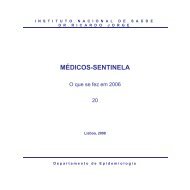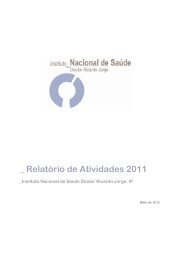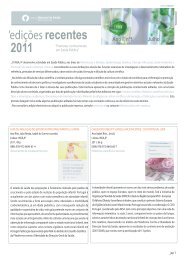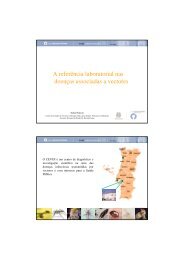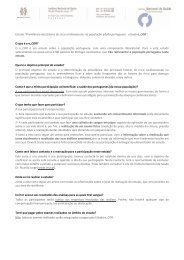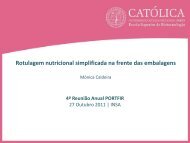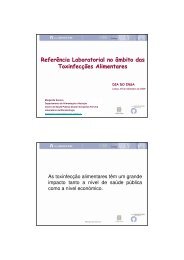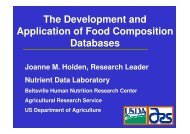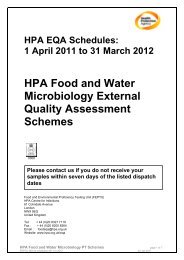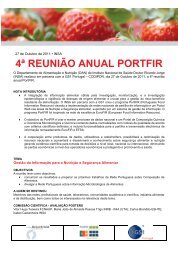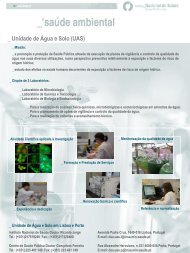European Society of Mycobacteriology - Instituto Nacional de Saúde ...
European Society of Mycobacteriology - Instituto Nacional de Saúde ...
European Society of Mycobacteriology - Instituto Nacional de Saúde ...
Create successful ePaper yourself
Turn your PDF publications into a flip-book with our unique Google optimized e-Paper software.
PP-12<br />
Genomic characterization <strong>of</strong> Lisboa<br />
family strains by <strong>de</strong>letion analysis<br />
João Perdigão, Carla Silva and Isabel Portugal<br />
Centro <strong>de</strong> Patogénese Molecular, URIA, Faculda<strong>de</strong> <strong>de</strong> Farmácia da Universida<strong>de</strong> <strong>de</strong> Lisboa<br />
Multidrug and extensive drug resistant tuberculosis poses a very serious threat for public health. Lisbon Health Region<br />
has one <strong>of</strong> the world’s most serious situations regarding this problem. Such, is the result <strong>of</strong> a continued circulation <strong>of</strong> an<br />
en<strong>de</strong>mic and predominant strains <strong>of</strong> a particular genetic family – Lisboa family. Little is known regarding the phylogeny,<br />
relative virulence and genetic background <strong>of</strong> these strains. The loss or <strong>de</strong>letion <strong>of</strong> specific genomic regions constitutes<br />
the most important way by which Mycobacterium tuberculosis diverges and adapts. Several <strong>de</strong>letions, named Regions<br />
<strong>of</strong> Difference (RD), have already been <strong>de</strong>scribed and associated with phylogeographic lineages. The characterization <strong>of</strong><br />
Lisboa family in this manner may elucidate its origin and perhaps be helpful in explaining its high prevalence.<br />
Three representative clinical isolates <strong>of</strong> different genetic clusters <strong>of</strong> strains circulating in Lisbon Health Region were<br />
screened for the presence <strong>of</strong> 16 distinct RDs. Deletion <strong>de</strong>tection was performed by PCR carried out using primers flanking<br />
each RD. Confirmation was performed by sequencing analysis.<br />
All three isolates were found to possess four <strong>of</strong> the tested <strong>de</strong>letions: TbD1, pks15/1, RD174 and RD RIO . It was not possible<br />
to discriminate between the strains using this <strong>de</strong>letion typing approach. However, it was possible to infer on the<br />
phylogeography <strong>of</strong> these strains. The presence <strong>of</strong> TbD1 and pks15/1 <strong>de</strong>letion positions the strains in the mo<strong>de</strong>rn and<br />
Euro-American lineage, respectively. On the other hand, RD174 suggests that the analyzed strains are related to the<br />
West-African sub-lineage.<br />
The present study point toward the fact that Lisboa strains and others circulating in Lisbon belong to Mycobacterium<br />
tuberculosis mo<strong>de</strong>rn lineages <strong>of</strong> the Euro-American lineage, West-African sub-lineage, therefore revealing more on Lisboa family’s origin.<br />
84 ESM 2009



